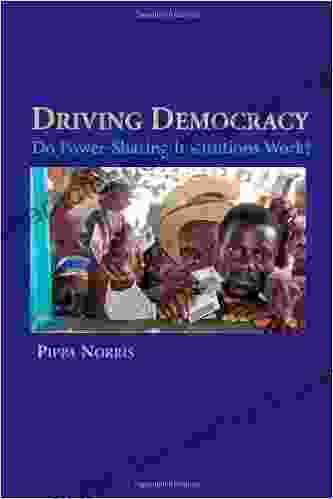Driving Democracy: Do Power Sharing Institutions Work?

In a world marked by ethnic, religious, and political divisions, the pursuit of democracy and political stability remains an elusive goal. One approach that has gained traction in recent decades is the establishment of power sharing institutions designed to accommodate and balance the interests of diverse societal groups.
4.1 out of 5
| Language | : | English |
| File size | : | 4277 KB |
| Text-to-Speech | : | Enabled |
| Screen Reader | : | Supported |
| Word Wise | : | Enabled |
| Print length | : | 320 pages |
| Lending | : | Enabled |
Power sharing arrangements have been implemented in various conflict-torn and post-conflict societies, with the aim of fostering inclusivity, reducing tensions, and promoting democratic governance. However, their effectiveness and long-term viability have been subjects of ongoing debate and research.
Models of Power Sharing
Power sharing institutions come in various forms, each tailored to the specific context of the society it is intended to serve. Some common models include:
- Consociationalism: A framework that divides power among distinct societal groups, each with its own veto power over decisions affecting their interests.
- Grand Coalition: A broad-based government that includes virtually all significant political parties, regardless of their ideological differences.
- Ethnic Quotas: A system that reserves a certain number of seats or positions in government for individuals from specific ethnic or minority groups.
- Cantonization: A territorial arrangement that grants autonomy to different ethnic or religious groups within a larger federation.
Case Studies: Successes and Challenges
The effectiveness of power sharing institutions has been tested in numerous case studies around the world. Some notable examples include:
- Northern Ireland: Consociational power sharing has been instrumental in reducing violence and promoting stability in Northern Ireland, despite ongoing political and economic challenges.
- Lebanon: A complex power sharing system based on ethnic and religious groups has helped maintain a delicate balance in a country plagued by sectarian tensions.
- South Africa: Power sharing arrangements played a crucial role in the transition to democracy after apartheid, although challenges remain in addressing socioeconomic inequalities.
- Bosnia and Herzegovina: A grand coalition government has been relatively successful in preventing a relapse into ethnic conflict, but faces challenges in implementing reforms and overcoming ethnic divisions.
Factors Influencing Effectiveness
The effectiveness of power sharing institutions is influenced by a range of factors, including:
- Political Culture: A cooperative and conciliatory political culture can facilitate successful power sharing, while an adversarial or zero-sum mentality can hinder it.
- External Support: International involvement, mediation, and financial assistance can bolster power sharing arrangements and help overcome obstacles.
- Power Balance: A relatively equal distribution of power among societal groups can promote cooperation and reduce conflict, while imbalances can lead to instability.
- Institutional Design: The specific design of power sharing institutions, including the allocation of power, decision-making procedures, and accountability mechanisms, can impact their effectiveness.
Challenges and Criticisms
Despite their potential benefits, power sharing institutions are not without their challenges and criticisms:
- Elite Capture: Power sharing arrangements can sometimes be dominated by a small group of elites, who may prioritize their own interests over those of the broader society.
- 僵局:权力分享制度可能会因各个集团对关键问题无法达成共识而导致僵局和决策瘫痪。
- 潜在的分裂路线:权力分配方式可能会强化身份差异和群体之间的分歧,而不是弥合它们。
- 伊拉克战争的持久性:权力分享制度可能会在多元社会中建立一个永久的群体之间的权力分配,从而导致长期的分歧和不满。
结论
The question of whether power sharing institutions are effective in driving democracy remains complex and multifaceted. While they have shown promise in some contexts, their effectiveness is contingent on a range of factors, including the political culture, power balance, institutional design, and external support.
Power sharing institutions are not a panacea for all societal divisions. They require careful design, implementation, and ongoing monitoring and evaluation to ensure that they promote inclusivity, reduce conflict, and foster democratic governance.
However, when implemented effectively, power sharing institutions can provide a valuable framework for accommodating diversity, addressing historical grievances, and building a more just and democratic society.
4.1 out of 5
| Language | : | English |
| File size | : | 4277 KB |
| Text-to-Speech | : | Enabled |
| Screen Reader | : | Supported |
| Word Wise | : | Enabled |
| Print length | : | 320 pages |
| Lending | : | Enabled |
Do you want to contribute by writing guest posts on this blog?
Please contact us and send us a resume of previous articles that you have written.
 Book
Book Novel
Novel Text
Text Genre
Genre Library
Library Paperback
Paperback Magazine
Magazine Sentence
Sentence Shelf
Shelf Bibliography
Bibliography Foreword
Foreword Synopsis
Synopsis Annotation
Annotation Scroll
Scroll Codex
Codex Tome
Tome Classics
Classics Biography
Biography Autobiography
Autobiography Reference
Reference Dictionary
Dictionary Librarian
Librarian Card Catalog
Card Catalog Stacks
Stacks Periodicals
Periodicals Study
Study Research
Research Lending
Lending Reserve
Reserve Reading Room
Reading Room Special Collections
Special Collections Interlibrary
Interlibrary Study Group
Study Group Thesis
Thesis Dissertation
Dissertation Awards
Awards Reading List
Reading List Book Club
Book Club Theory
Theory Textbooks
Textbooks Fik Meijer
Fik Meijer Aleera Anaya Ceres
Aleera Anaya Ceres Alynna J Lyon
Alynna J Lyon Steven Salaita
Steven Salaita Frederick Dudek
Frederick Dudek Srimati Basu
Srimati Basu Cara Firestone
Cara Firestone Tim Calkins
Tim Calkins Thomas Keil
Thomas Keil Konrad Wiesendanger
Konrad Wiesendanger Maricela Soberanes
Maricela Soberanes Kathy Foley
Kathy Foley Michael D Brooks
Michael D Brooks Kelly Murphy
Kelly Murphy Victor S Navasky
Victor S Navasky Yorick Wilks
Yorick Wilks Dayna Laur
Dayna Laur Ken Wheaton
Ken Wheaton Cathal Coyle
Cathal Coyle Marie Ferrarella
Marie Ferrarella
Light bulbAdvertise smarter! Our strategic ad space ensures maximum exposure. Reserve your spot today!

 Terence NelsonThis Is Not How It Ends: A Haunting Tale of Loss, Hope, and the Power of Love
Terence NelsonThis Is Not How It Ends: A Haunting Tale of Loss, Hope, and the Power of Love
 Elmer PowellThe Ultimate Study Guide for Julia Alvarez's How the Garcia Girls Lost Their...
Elmer PowellThe Ultimate Study Guide for Julia Alvarez's How the Garcia Girls Lost Their...
 Mario Vargas LlosaColton Target: The Coltons of Grave Gulch - An Enthralling Western Adventure
Mario Vargas LlosaColton Target: The Coltons of Grave Gulch - An Enthralling Western Adventure
 Demetrius CarterDelving into the Realm of Hydrocarbon Fluid Inclusions: A Comprehensive Guide...
Demetrius CarterDelving into the Realm of Hydrocarbon Fluid Inclusions: A Comprehensive Guide... Garrett BellFollow ·7.3k
Garrett BellFollow ·7.3k Jerry WardFollow ·10.1k
Jerry WardFollow ·10.1k Aaron BrooksFollow ·4.1k
Aaron BrooksFollow ·4.1k Joel MitchellFollow ·5.5k
Joel MitchellFollow ·5.5k Brian WestFollow ·19.8k
Brian WestFollow ·19.8k Elmer PowellFollow ·17.4k
Elmer PowellFollow ·17.4k Darius CoxFollow ·2.9k
Darius CoxFollow ·2.9k Dashawn HayesFollow ·6.5k
Dashawn HayesFollow ·6.5k

 Ronald Simmons
Ronald SimmonsHow Do Cities Work? Let's Read and Find Out!
Cities are...

 Tom Clancy
Tom Clancy25th European Symposium on Research in Computer Security...
<p>Guildford,...

 Lawrence Bell
Lawrence BellHow We Decide: Cognitive Behavior in Organizations and...
Organizations are...

 E.M. Forster
E.M. ForsterOver 60 Little Masterpieces To Stitch And Wear:...
Embark on a Creative...

 Douglas Foster
Douglas FosterUnveiling the Educational Treasure: CGP KS2 Geography:...
In the ever-evolving educational...
4.1 out of 5
| Language | : | English |
| File size | : | 4277 KB |
| Text-to-Speech | : | Enabled |
| Screen Reader | : | Supported |
| Word Wise | : | Enabled |
| Print length | : | 320 pages |
| Lending | : | Enabled |






